John Grove Speer
Miner, Postmaster, Doctor, Sailor
On p91 of the "Speer Family" book, at the end of his first gold mining venture, John Grove Speer wrote:
Miner
"My next mining was in company with Captain J. B. Ford, of Louisville, Kentucky, who solicited me to join him on a mining tour. He was a man among men, a high-toned honorable gentleman and as reliable and industrious as any one could be. I saw him in Louisville a few years after my return. He with his son, J. B. Ford Jr., were in the steamboat business and ran one that was name "J.B.Ford." We mined together for several months and made some money and would have made more, but for lack of water. We were operating in dry diggings and gathering up dirt ready to be washed when the rainy season commenced, in September, and which continued until April. Of course all this rain filed up all the streams and there is water everywhere, and the deep snows on the Pacific slope of the Sierra Nevada Mountains, as it comes rushing, surging down through the gorges and canyons finds it way by the three Yuba Rivers to the Feather and Sacramento Rivers, and into the gulf at San Francisco. One summer I mined on the South Yuba and the melting of the snow during the day caused it to rise about three feet daily.""During the summer or dry season there is neither thunder nor lightning, and no clouds to obscure the sun. Summer or winter the climate is pleasant. In seven years I never saw ice one-eight of an inch thick."
"Again a company of eight men went up about forty miles to where we struck camp, built a house, and dug a race to turn the waters of a creek in order to work its bed. This took us some time for it was one or two hundred yards long. Here we did a great amount of work and ate up a quantity of costly provisions and took out about twenty-five dollars. Then our money all gone, we were in a worse fix than ever.
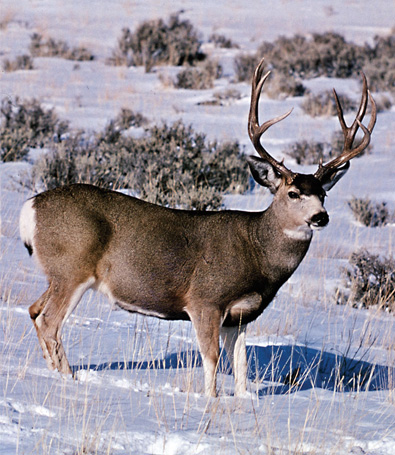 | 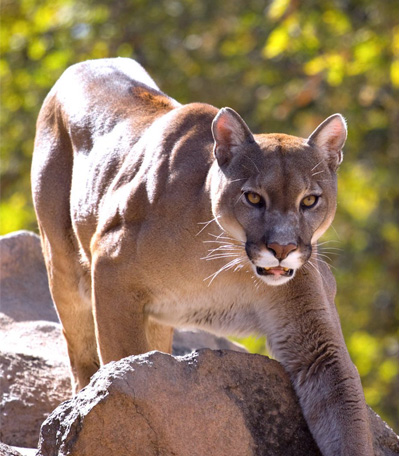 |
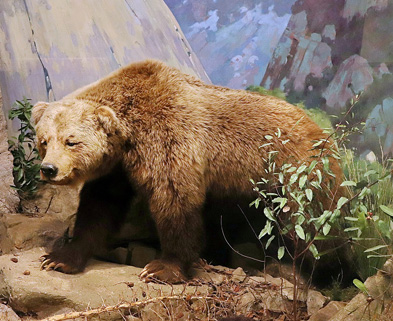 |  |
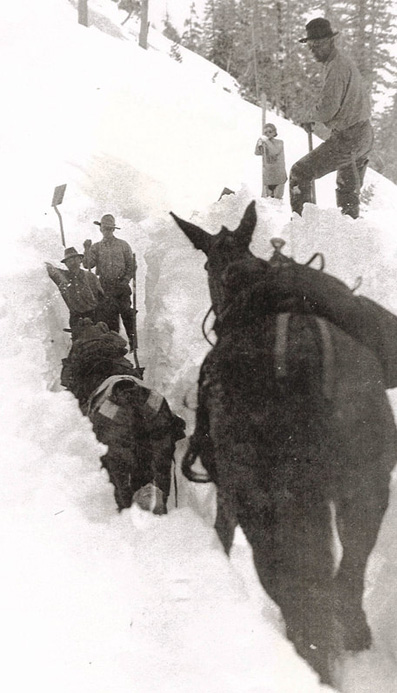 | "Having made nothing that summer we were ready to shift to other places and try it again. Just then several inches of snow fell and a packer and miner who had two mules and a horse found he would have to take them to the valley. This was my chance to get away; and so three of us started, and none too soon for it snowed until it got so deep that one mule gave out, and farther on the horse gave out. We pressed on and up the mountain, the snow getting deeper and deeper; when night compelled us to call a halt, and build a fire, cook some supper, spread our Buffalo robe and blanket, lay ourselves down, trust the Lord and wait the morning's dawn. In the morning we put our pack on the only mule left, and two of us had to go before it to break the way so it could travel, as the snow was over three feet deep. Our elbows cut into the snow as we passed along. Finally we descended into the valley where everything was covered with water, and stock grazing. Then we were thankful and stopped at the blue tent kept by William Lindsey of Kentucky, got something good to eat, stayed until next morning and then went to Nevada City. There I saw William Watkins, a friend of mine whom I had doctored on the plains and in California. He and another man had a good claim, and I bought a third interest in it; they were taking about eight dollars a day apiece. After I joined them we each took out sixteen dollars a day. Here was where I did the best mining while there, but we were not long in working it out; I sent some of this home, I think two hundred dollars; that is, I sent a check to father, and he cashed it in Louisville. " |
"I mined in other places, with some success visiting other mining sections, saw the quartz rock being crushed to get out the gold that was in its virgin purity, which was paying richly. Many others sank shafts into the ground and then dig under and timbered up and elevated the pay dirt with a windlass. In all I spent about four years in prospecting and mining."
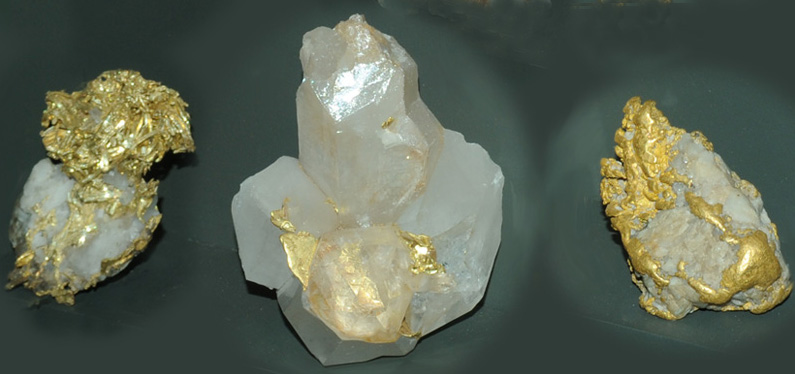
The samples of gold with quartz are from the Grass Valley district, Nevada County, California
Postmaster
The next business in which I was engaged was the practice of medicine and assisting Dr C. T. Overton in attending to the postoffice in Nevada City as deputy postmaster. For this service I received one hundred dollars s month, and if the government would allow it, I would get that sum. He made the application, consulted John J Crittenden, senator from Kentucky, but to no purpose. There for months I did faithful service, for the mails were heavy, and twice a month the Atlantic mail brought about two thousand letters, besides the other mail which had all to be handled and delivered to the thousands here in the mines and up in the mountains. Express men would come down from away up in the mountains with long lists of names, then we would have to look over and find the letters addressed to each one of these for which we were paid twenty-five cents and the express men charged the same or more. This made letters cost something, but those people were glad to hear from their loved ones left behind and cheerfully paid that and would have paid more if it had been necessary. I have seen and heard much anxiety expressed by men to hear from home and friends and no wonder for I felt that way too. Thanks to our government and the fast ocean mail steamers for this service which cheered the hearts of many men on the Pacific slope. Dr. Overton put up private boxes in the office for which he charged fifty cents a month for each name and this paid in advance, which brought him in a good sum of money and after months of service he concluded he would sell them to me, his good bed and bedding and take steamer for home to see his beautiful young wife an that little baby girl he had left behind. The office was left in my charge and I became acting postmaster. I paid him for all his private property and attended the office and would have made a good thing of it, had it not been that a new postmaster was apointed and I held the place only about three months, and then was cheated out of what I paid the doctor for his private boxes. He promised faithfully he would pay me two hundred dollars for all; but never did, and told me he never would. He was worthless and unworthy the confidence placed in him as a man, and a Kentuckian of a fine family."Doctor
"In the spring following, Dr. Overton returned with his wife and little girl to make California his permanent home. I had again been mining, and as soon as he saw me he proposed that we go in partnership in the practice of medicine, to this I consented, and we were soon in an office waiting to see who would need our services. "
For months we were there and did a considerable business, but there was not as much clear money made as we expected. Just at that time provisions were high, flour had to be brought from Chili, and potatoes from Oregon. I had to pay eighteen dollars a week at my hotel. We learned more about securvy with which many were afflicted than we ever knew before. The worst case of inflamatory rheumatism I ever attended was there. The population was necessarily transient, here today and gone tomorrow, whether debts were paid or not, and we often lost by that process. I thought much of the Doctor and his wife who had now bought a home and were snugly domiciled in it, and seemed to be in the full enjoyment of the blessings of life, health and friends."
"Twice the City of Nevada was almost swept off the face of the earth by fire; the last time five men lost their lives, three of them by refusing to leave their fire proof brick stores, which did not prove to be fireproof, and had they been such they would not have been life-proof in so great a conflagration. There was but one grocery store left in the city. I was there and assisted my honored friend Judge Beckner of Kentucky in removing his fine furniture from his house to a place of safety. His wife was a Dudley and a relative of that noted family of Kentucky, some of whom I personally know. Dr. Benjamin Winslow Dudley one of the most noted surgeons west of the Alleghany mountains was Professor of Anatomy and Surgery in the Medical College in Lexington, Ky. when I attended that institution in 1829-30. I saw him perform a very important operation for stone in the bladder which he said was the eightieth case successfully performed. I learned from him that by all means get the system of the individual in as healthy condition as possible, even if it takes weeks before a capital surgical operation, so that healing of the wound will take place by first intention."
"Now we will return to California incidents, I could tell you of many other things seen in California but must hurry on to say that the time having come for me to leave the Golden State and start for my old Kentucky home, I made ready and took the stage for Sacramento where we went on a steamboat, plying the Sacramento River to San Francisco, being jostled about all night in the stage without sleep. Soon after we got on the boat I became sick and vomited but was soon all right again and that was the last of my sickness while on land, nor was I once sick on the sea and for this i was thankful, but many of my acquaintances were very seasick. | 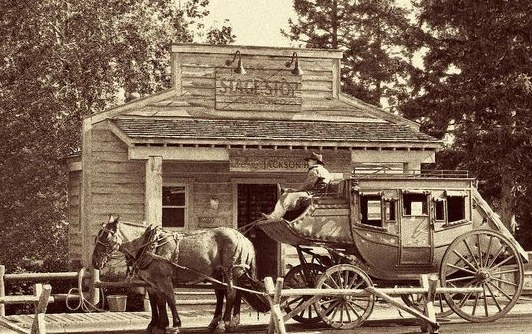 |
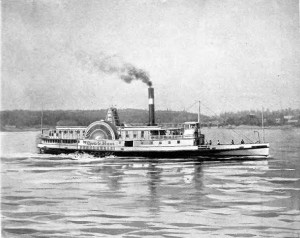 | This a steamboat which traveled on the Sacramento River from north central California to San Francisco. The side wheeler Wilson G. Hunt was built in New York in 1849. The steamer had a single cylinder engine powered by a low pressure boiler. Her dimensions were 185.5 feet long, 25.8 feet abeam and with a depth of 6.75 feet. The 250 horsepower steam engine could drive the boat at about 15 knots. It was built in 1849 and could have been the boat that John Grove Speer traveled on. I was surprised to find out that many larger steamboats traveled on the Sacramento River during this period, including the Delta King. See Steamboat History. See also Delta Queen. |
Sailor
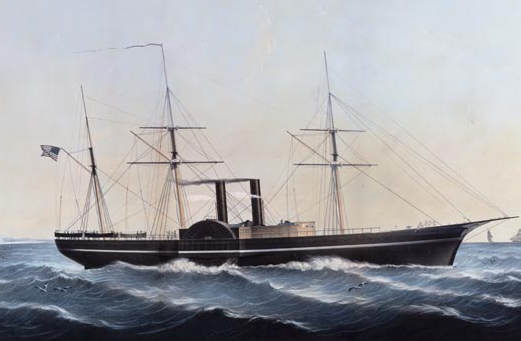 | The mail steamer Golden Gate was commissioned in 1851 and made trips from San Francisco to Panama. John Grove Speer made his return trip in 1857 according to his statement on pg 180 of the Reminiscences book. The Golden Gate was making the trip to Panama during those years. These ships were steam and sail vessels which could use either or both for propulsion. |
Dock of the Pacific Mail Steamship Company at South Beach (San Francisco) in the 1880s. One of the large steam-sail, sidewheel ships is in the back. | 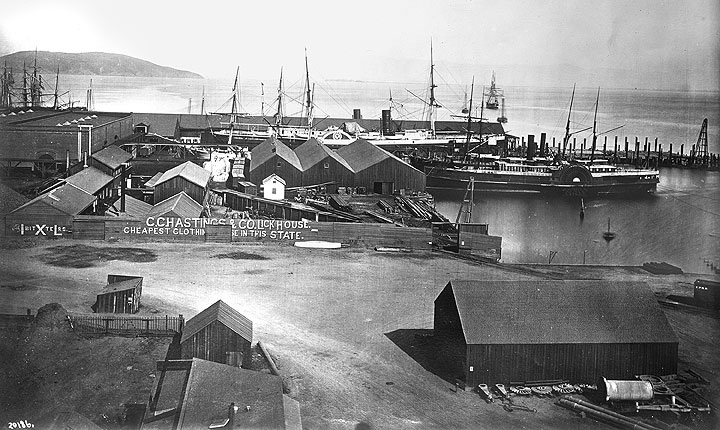 |
References:
The Earl of Cruise site has a number of pictures of mail steamers, including one which has a good chance of being the one Speer traveled on. It also has a contemporary sketch of the Panama region.
Pacific Mail Steamship Company shows dock at South Beach (San Francisco) in 1880s. It also had a ship used in the Panama-San Francisco run, but ran aground in 1853.
National Postal Museum site has the Northstar mail steamer as a nice image. It left New York in 1863, so was part of NY to Panama trip.
"I had provided myself with some Seidlitz powders and some Cognac Brandy as prophylactics and was always ready when meal time came do my share of that kind of business while out on the deep blue sea among the foaming white caps and raging billows where the whales congregate and the porpoises leap out and in to the briny deep and like the wild geese follow their leader in great droves. I saw them sporting and spouting up great volumes of water, seemingly about eighty feet high and four or five feet in diameter. At a distance of about ten miles from us there were three of these, and farther on we saw five more of the sea-oily monsters of the deep performing this mighty work, when we saw three whale ships making for them. It as a sight never to be forgotten so grand so sublime. If the column of water thrown up by the sperm whale seemed to be as large as described at a distance of ten miles, how large was it and how high in reality, and how far off were those that threw up a column of only ten inches in diameter? Please tell me if you can, as I do not know. "
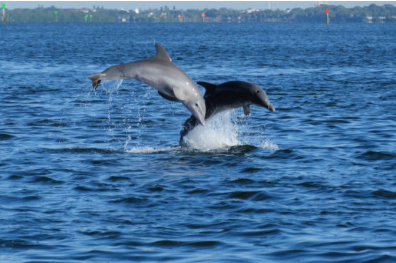
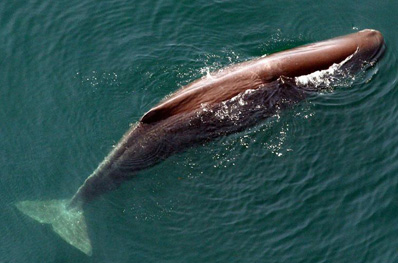
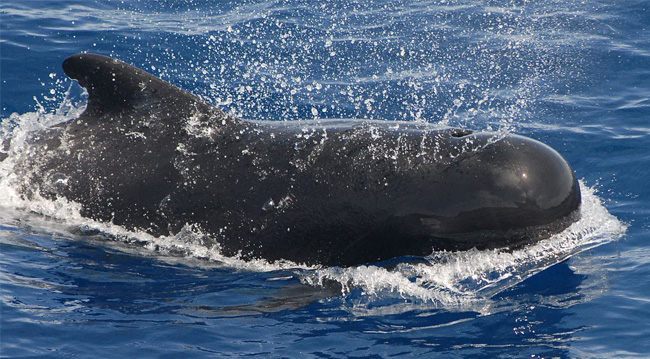
"I saw a large black whale lying on the surface sunning itself, I suppose, and floating on the waves. They are much larger than the sperm, but are not sought after as the others by whalers. Soon after our ship was fairly out on the beautiful deep blue sea."
"On and on our noble vessel plows the deep, about seven hundred passengers have laid their bodies down in their bunks for a night's rest. All is quiet. Suddenly a fire alarm is heard and the vessel is filled with smoke and many, aroused from their slumbers, roll out pretty badly frightened, then the men at their posts cry aloud; 'The fire is out, ' and all are safe. Then again all quiet down. The fire had caught in the stone coal near the mouth of the furnace and was soon put out by a stream from heir hose. This caused the smoke. On we go to Acapulco, on the coast of Mexico, there to take in a supply of fresh water and beef cattle. This is a beautiful port and it was very interesting to see the natives bring the long-horned steers to the ship, and the crew windlass them up on the deck out of the water by a rope around their horns only. One of the natives, as the ship began to move, leaped from it, head foremost, into the foaming sea, and like a duck, popped up near the craft to which the beeves were attached. His comrades reaching down caught him by the hand and lifted him on deck again. Their occupation is to supply all vessels with fresh beef, water and tropical fruits. From the dispatch with which this was done, I have no doubt that it pays them well. "
"Now the steam is up, the sails unfurled and we are destined for Panama, where under a tropical sun and a clear sky in June we cast anchor in that ancient renowned harbor where stands the old town, Panama. Our vessel came to a standstill at a pier and being evening, and too late to cross by rail to Colon, we remained on ship board until early the next morning when we went on land, and at the depot entered a car, took our seats and were again traveling at good speed through a level, rich, timbered country with here and there a patch of ground cleared and a cabin near by, its tenants, the blackest of free negroes, who have lived here the Lord knows how long, but never progressed in the art of civilization; and if left to themselves, never will. They seem indolent and careless and live off of the fruits that grow so abundantly here, bananas, oranges, lemons, pineapples, nuts and other things such as melons, etc., that are had with scarcely any cultivation. "
"Some of the men worked on the railroad when being constructed by and English company."
Here we saw monkeys, parrots and other feathered songsters of the most beautiful plumage of the feathered species we ever looked at. I went on the morning train which had to make a second run to bring the remaining passengers, treasure, mail, etc., for New York."
 |  |
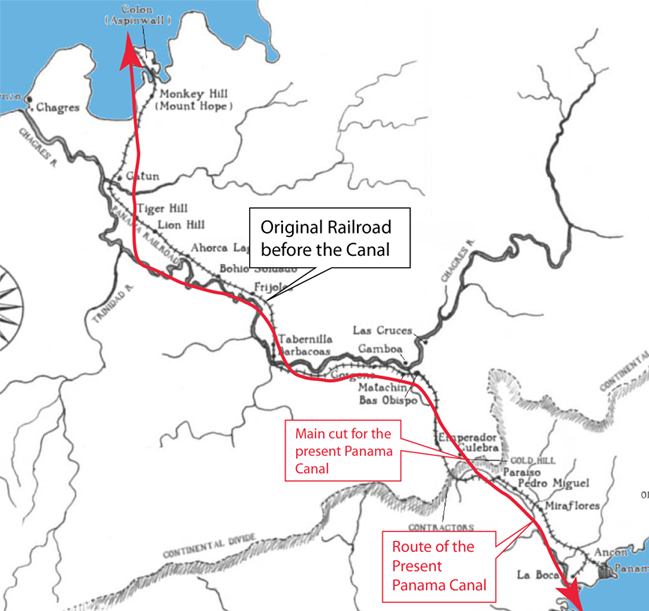 | This shows the path of the old railroad before the completion of the Panama Canal on August 15, 1914. The railroad route of those pre-canal days was significantly different from the path of the current day railroad across Panama. You can note that a considerable portion of that original rail route is now waterway. That new route can be examined in the article "Panama Canal Railway". A new rebuild of the railroad was opened in 2001, and as of 2018 there is a daily rail service between Colon and Panama City. While the main purpose of the train is as a commuter rail for those living in Panama City and working in Colon, it has also become a popular tourist excursion. |
Note that in comparison to the time of the original railroad across Panama, there is much more water on the pathway of the current canal. Consult the article History of the Panama Canal for more discussion of its construction. The Gatun dam, constructed between 1907 and 1913, is a crucial element of the Panama Canal; it impounds the artificial Gatun Lake, which in turn carries ships for 33 kilometres (21 mi) of their transit across the Isthmus of Panama. In total, all but 15 miles of the Panama Canal is traversed upon lakes impounded by dams that were designed and constructed by the Army's engineers. The shoreline to shoreline distance of the canal pathway is about 40 miles. | 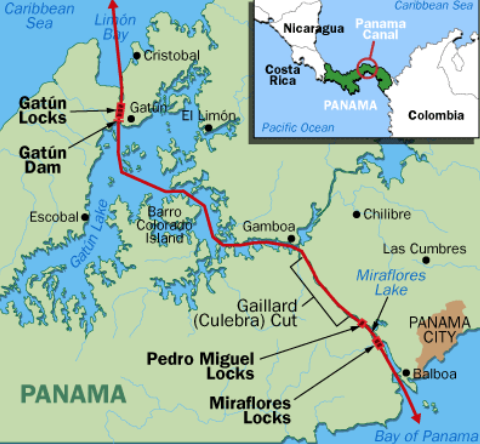 |
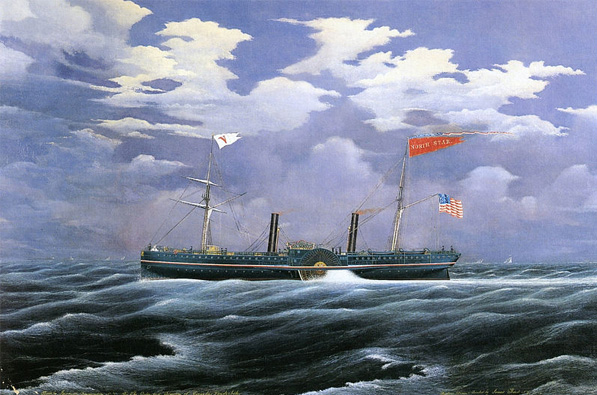 | This is an image of the Northstar mail steamer which made the trip between Panama and New York. It operated from 1863, so was the type of ship that was in service for Speer's return journey from Panama to New York City. |
Here we took an extra dinner, and were ready late in the evening to take the other mail steamer for New York. Everything aboard, off we sailed again to plow the more tempestuous Atlantic, and anon a heavy wind storm strikes us and the great waves rolling high, beat against the sides of the vessel. Down go the hatches to keep out the briny fluid while we are being rocked in a great cradle, as it were. Nothing daunted, the sailors are up n the rigging doing their duty among the sails as sailors only know how to do, when the Captain's commands come. After awhile the storm abates and we are in calmer water. The wind having shifted from south to west struck the stern of the vessel and helped us to increase our speed. With sails set to the breeze, we needed only enough steam to keep the wheels in motion, for it was run by steam or sails, or both if necessary. By steam it was able to run against wind and storm and ride the great rolling billows lying in its course."
"Out of the Carabean Sea we passed around Florida and saw and spoke to some vessels and on to New York, run up the North River to the foot of Courtland Street, where we disembarked. After securing lodging, we ate a good supper at a restaurant, and returned an slept on land again. We stayed a day and two nights in New York. I was on Broadway, and also further up in town, purchased a nice suit of clothes, etc. After purchasing a ticket for Louisville, I crossed over to Jersey City, taking a train; route running through Pennsylvania and Ohio to Cincinnati; stopped at a hotel that night and early next morning crossed the Ohio River to Covington, Lexington, and on to Beards, Oldham County, Kentucky, to my home which was eighteen miles east of Louisville, Kentucky, where I found some of my children, all still alive, but separated. Some in Illinois, and some in Daviess County, Kentucky. Father having died, the dear old home, for once in forty-five years, was left without a tenant where once we worked, sported and congregated to enjoy the fruits of our labors and the company of relatives and friends; a sad reflection which admonishes us of the uncertainty and instability of all earthly things as time carries us on many are separated for a while from the loved ones, but may meet again to participate in each others joys and sorrows, but let death cut the golden cord and we are to see, meet and greet each other no more until the glorious resurrection morn. May it be the happy lot of us all to meet again in that blissful abode where the wicked cease from troubling and the weary are at rest, to part no more forever."
"After staying a while with kind relatives and friends, and having received some of my children, we left for Owensboro where some others were, and there remained until we visited relatives in the country and looked around for a home. One about sixteen miles from town, near Greenbrier church, was offered us, which was bought, and after buying a wagon, horses and provisions for a supply for ourselves and my two sons-in-law and families, we all moved to it, where we lived fairly well for a season. Now once more my children were all together, which was my heart's desire, but after a time they left one by one, and the others with myself were left alone with my single daughter, Ann Clyde, as housekeeper. By and by she was married to Mr. J. Tanner, and left me to wind up matters, sell the farm, and make another move for the good of all. John went to school and studied medicine, James William went south as a soldier in the Confederate army, and I with my two youngest boys, Marcus E. and Joseph A. returned to the old home at Oldham, where I engaged in the practice of medicine, boarding and sending them to school that they might be better qualified for life's work. Here I had quite a large practice. John H. read medicine with me and then attended the medical college in Cincinnati, Ohio, because there was no school that winter in Louisville. The civil war was going on, and the city was filled with federal soldiers. Here I remained until he took his second course in the Louisville medical school and graduated, when I married a cousin to my first wife, Lucy Taylor whose maiden name was Lucy Button, and although I owned a snug house and lot in the town and wished to live here, I was persuaded to go with her to her farm near the river, below Westport, where we lived until about a year after the war closed, when we moved to Hardinsburg, Shelby County, where I was kept busy for about eighteen months and until James W. Speer had graduated and was located where he now resides in Alton, Anderson County, Kentucky, then we went back near her old home. Expressing a desire to visit my children in Daviess County, whom I had not seen for several years, she said I ought to go, and urged me to do so. I reluctantly went because her health was so poor, I disliked to leave her. She was a good, kind wife, mother and neighbor, and said others might say what they would about Dr. J. G. Speer, but he had done his whole duty. This I did as all the neighbors know, and was in peace. Then some trouble came up and I went to Iliinois where I had so long lived and engaged again in my professional calling. Soon her mother, then her married daughter, and at last she died last before my return to Kentucky."
"Doctors J.W. and J.H. Speer having located, married and settled down to business in Kentucky, and M. E. Speer having also married, I came again among old neighbors and friends and for sometime made my home with the last named. In the meantime Joseph Albert Speer had studied medicine, graduated and is with me in Illinois at Lovington, Moultrie County, engaged in our profession. My dear old mother was yet living and I stayed with her and nursed her as well as I could, at the old home place, where lived sister Susan Hinkle, that might in some measure requite her for the love, care and attention she had given me when helpless. She died in the Christian faith February 18, 1876, and was laid away to rest beside the honored father and husband, where a monument tells the sad story. Father died November 12, 1856."
Reference: This material attempts to trace the journey based on the text of the book "Reminiscenses of the Speer Family" written by John Grove Speer when he was 91 and published in 1900.
| John Grove Speer 1890 |
1800's